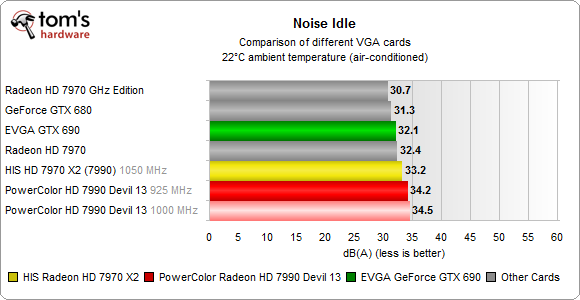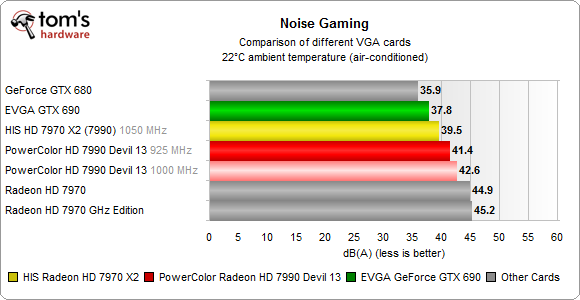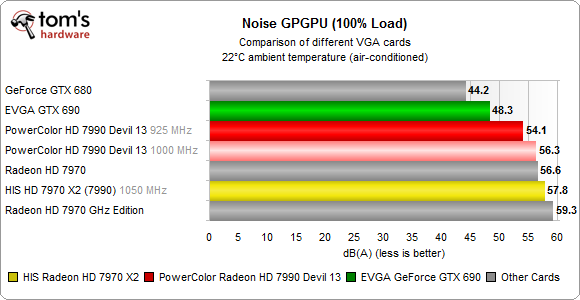Radeon HD 7990 And GeForce GTX 690: Bring Out The Big Guns
EVGA recently lent our German lab one of the GeForce GTX 690s we've had in the U.S. for months. The purpose? To pit against HIS' upcoming 7970 X2 and PowerColor's Devil13 HD7990, both dual-Tahiti boards vying to become the world's fastest graphics card.
Noise
Changes to How We Benchmark Noise
Typically, we use a regularly-calibrated Voltcraft SL-400 sound level meter with data logging for noise benchmarks run in our German test lab. The SL-400 doesn’t really go beyond 10 kHz, though, and is useless for picking up coil squealing.
PowerColor's Devil13 HD7990 drove us nuts with its high-pitched whine, though, so we had to make a change to our testing methodology in order to reflect this. Now we're using a calibrated and vibration-free suspended studio microphone.
PowerColor's Devil13 HD7990 would have done well were it not for the high-pitched coil squealing beyond the capacity of most sound meters. As a result of this whine, however, it finishes in last place.
We had two of these cards at our disposal: one in Germany and one in the U.S. Both exhibited the exact same behavior to different degrees. The severity of the squeal varies depending on resolution and load, but it's definitely an irreconcilable issue that we wouldn't be able to overcome on a $1000 graphics card.
EVGA's GeForce GTX 690 is the quietest card when it comes to gaming. This shouldn't come as a surprise because it dissipates the least amount of heat.
All three boards fare well enough, though. PowerColor's Devil13 HD7990 is the loudest, but it still makes less noise than AMD's reference Radeon HD 7970. That's a testament to the effort all three vendors put into prioritizing acoustics, and we can only hope that AMD's own engineers are paying attention.
Get Tom's Hardware's best news and in-depth reviews, straight to your inbox.
Under full load, HIS' 7970 X2 simply cannot keep up, losing to EVGA's GeForce GTX 690 and PowerColor's Devil13 HD7990. In fact, it even falls behind the reference Radeon HD 7970 that bothered us so much when we first reviewed it. None of the AMD cards can claim a victory, though. They all generate in excess of 50 dB(A), which is just too loud. Only EVGA's solution stays under that threshold.
Fortunately, most folks won't be pushing their cards this hard for any extended period of time, making the two other usage scenarios (idle and gaming) more important to heed.

Igor Wallossek wrote a wide variety of hardware articles for Tom's Hardware, with a strong focus on technical analysis and in-depth reviews. His contributions have spanned a broad spectrum of PC components, including GPUs, CPUs, workstations, and PC builds. His insightful articles provide readers with detailed knowledge to make informed decisions in the ever-evolving tech landscape
-
mayankleoboy1 IMHO, the GTX690 looks best. There is something really alluring about shiny white metallic shine and the fine metal mesh. Along with the fluorescent green branding.Reply
Maybe i am too much of a retro SF buff :) -
Ironslice What's the most impressive is that the GTX 690 was made by nVidia themselves and not an OEM. Very nice and balanced card.Reply -
thanks for the in depth analysis with adaptive V-sync and radeon pro helping with micro stutter.Reply
not to take away anything for the hard work performed; i would have liked have seen nvidia's latest beta driver, 310.33, included also to see if nvidia is doing anything to improve the performance of their card instead of just adding 3d vision, AO, and sli profiles. -
RazorBurn AMD's Dual GPU at 500+ Watts of electricity is out for me.. Too Much Power and Noise..Reply -
mohit9206 2 670's in sli is better than spending on a 690 and 2 7950's in Xfire is better than spending on a 7990. this way you save nearly $300 both waysReply


